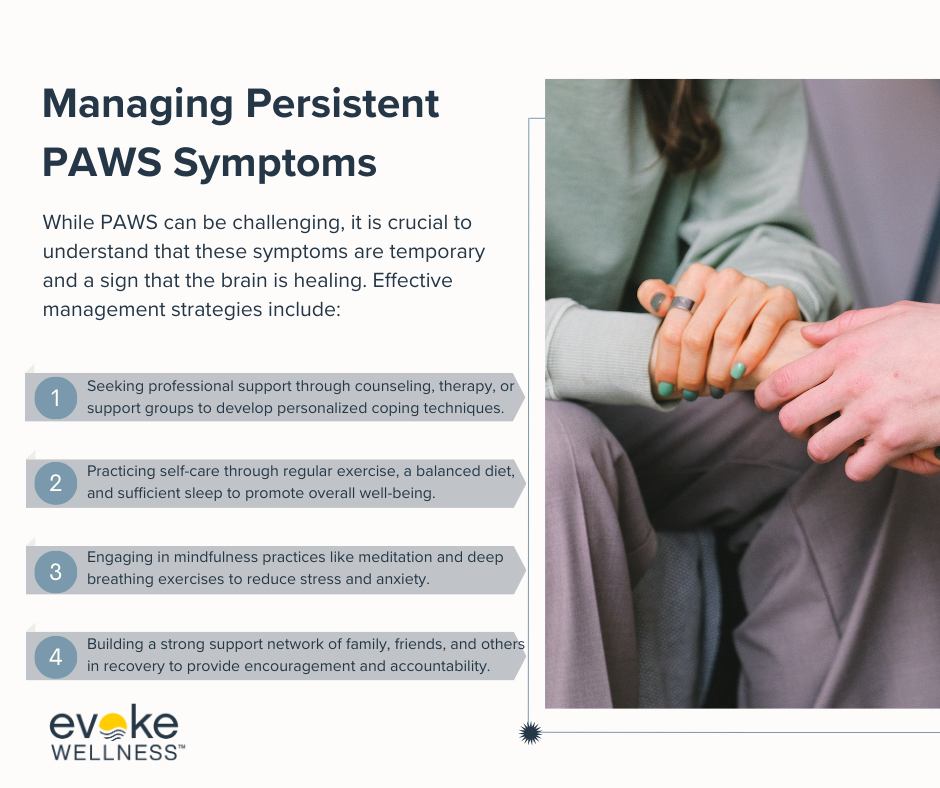As you embark on your journey to recovery, you may encounter an often-overlooked hurdle: Post-Acute Withdrawal Syndrome (PAWS). This complex condition affects up to 75% of individuals recovering from substance use disorders, presenting significant challenges to long-term sobriety. Recent studies indicate that PAWS symptoms can persist for up to two years after initial detoxification, underscoring the importance of comprehensive, ongoing care. By exploring the intricacies of PAWS, its impact on mental health, and effective coping strategies, you’ll be better equipped to navigate this crucial phase of recovery. Let’s delve into the world of PAWS and discover how addiction treatment, mental health support, and therapeutic approaches can pave the way for lasting wellness.
Together, let’s embrace the journey to recovery and the promise of a new beginning. Call us at (866)429-2960 today or reach out online.
Understanding Post-Acute Withdrawal Syndrome (PAWS)
Defining PAWS and Its Impact
Post-Acute Withdrawal Syndrome (PAWS) refers to a cluster of mental and physical symptoms that can persist for weeks, months, or even years after the initial withdrawal phase from addictive substances like alcohol, opioids, and stimulants. According to Evoke Wellness, these lingering effects can significantly impact personal relationships, work productivity, and overall quality of life during recovery.
Common symptoms include mood swings, anxiety, depression, irritability, fatigue, sleep disturbances, poor concentration, and persistent cravings. While challenging, PAWS is a normal part of the brain’s adjustment to functioning without the presence of addictive substances.
Prevalence and Risk Factors
PAWS is a widespread phenomenon, particularly among individuals recovering from alcohol use disorders. One study notes that PAWS can increase the risk of relapse if not properly managed through comprehensive addiction treatment, including medical detox, therapy, and aftercare support.
Certain factors may heighten the likelihood of experiencing PAWS, such as the duration and severity of substance abuse, co-occurring mental health conditions, and a lack of proper support during the recovery process.
Overcoming PAWS Through Integrated Treatment
Managing PAWS requires a multifaceted approach that combines medical interventions, therapeutic support, and lifestyle changes. Evoke Wellness offers comprehensive programs designed to address PAWS and promote lasting recovery, including:
- Medication-assisted treatment to alleviate withdrawal symptoms and cravings
- Individual and group counseling, such as cognitive-behavioral therapy (CBT), to develop healthy coping mechanisms
- Dual diagnosis treatment for co-occurring mental health disorders like depression or anxiety
- Participation in support groups and 12-step programs
- Mindfulness practices, exercise, and stress management techniques
- Ongoing aftercare and relapse prevention strategies
By recognizing PAWS as a normal part of the recovery journey and seeking professional support, individuals can navigate these challenges successfully and maintain long-term sobriety.
Recognizing the Signs and Symptoms of PAWS
Emotional and Psychological Symptoms
Post-Acute Withdrawal Syndrome (PAWS) often manifests through a range of emotional and psychological symptoms. These can include mood swings, anxiety, depression, irritability, and difficulties with concentration or memory. According to a study by Semel Institute, up to 90% of individuals in recovery experience some form of PAWS.
Distinguishing these symptoms from underlying mental health conditions can be challenging. It’s crucial to seek professional support to properly assess and address PAWS and any co-occurring disorders.
Physical Symptoms
PAWS can also present with physical symptoms, such as fatigue, muscle aches, insomnia, and changes in appetite. These symptoms can vary in intensity and duration, lasting for weeks, months, or even years after acute withdrawal. As reported by the Substance Abuse and Mental Health Services Administration (SAMHSA), PAWS is a common experience in the recovery process, affecting individuals who have overcome substance use disorders.
Cognitive Impairments
Cognitive difficulties are another hallmark of PAWS. Individuals may experience problems with memory, concentration, decision-making, and processing information. These cognitive impairments can significantly impact daily functioning and quality of life. PAWS-related cognitive deficits can persist for up to two years after cessation of substance use.
Understanding the diverse symptoms of PAWS is crucial for effective management and support during the recovery journey. Seeking professional help from addiction specialists and mental health professionals can provide the necessary guidance and treatment strategies to navigate this challenging phase successfully.
The Role of Dual Diagnosis Treatment in Addressing PAWS
Integrated Approach
Overcoming post-acute withdrawal syndrome (PAWS) is a significant challenge, especially for those with co-occurring substance use and mental health disorders. A comprehensive dual diagnosis treatment offers an integrated approach, addressing both conditions simultaneously. This holistic strategy combines evidence-based therapies, medication management, and supportive services to tackle the complex interplay between addiction and mental illness.
Cognitive-Behavioral Therapy
A cornerstone of dual diagnosis treatment is cognitive-behavioral therapy (CBT). CBT helps individuals recognize and modify negative thought patterns and behaviors contributing to both their substance abuse and mental health struggles. By developing healthy coping mechanisms and challenging distorted beliefs, CBT equips individuals with the tools to manage PAWS symptoms effectively, reducing the risk of relapse.
Addressing Underlying Factors
Dual diagnosis treatment also focuses on addressing the underlying factors that may have contributed to the development of co-occurring disorders. Trauma-informed care, including specialized interventions like Brainspotting, helps individuals process past traumatic experiences that may exacerbate PAWS symptoms. Additionally, holistic approaches such as nutrition therapy, exercise, and mindfulness practices support overall well-being and aid in restoring brain chemistry during the extended PAWS recovery phase.
Comprehensive Support System
A vital component of dual diagnosis treatment is the establishment of a comprehensive support system. Family involvement through education and therapy sessions helps loved ones understand the complexities of co-occurring disorders and PAWS, enabling them to provide a supportive environment for ongoing recovery. Peer support groups and relapse prevention strategies tailored to both addiction and mental health triggers further reinforce the individual’s ability to maintain stability throughout the PAWS period and beyond.
By integrating addiction and mental health treatment, dual diagnosis programs offer a comprehensive approach to addressing PAWS, empowering individuals to reclaim their lives and achieve lasting recovery.
Therapeutic Approaches for Managing PAWS
In navigating the challenges of post-acute withdrawal syndrome (PAWS), a comprehensive and holistic approach is crucial. PAWS can persist for weeks, months, or even years after stopping substance use, characterized by persistent symptoms like mood swings, anxiety, depression, fatigue, and cravings. According to a recent review, evidence-based therapies offer promising strategies for managing this complex condition.
Psychotherapy Interventions
Cognitive-behavioral therapy (CBT) is a cornerstone of PAWS management, equipping individuals with coping mechanisms to address triggers, negative thought patterns, and emotional dysregulation. Through CBT, patients develop skills to reframe harmful beliefs, regulate emotions, and implement relapse prevention techniques.
Mindfulness-Based Approaches
Mindfulness practices, such as meditation and yoga, have gained traction in PAWS treatment. These techniques cultivate present-moment awareness, reduce stress and anxiety, and promote emotional regulation – critical skills for navigating the emotional turbulence of PAWS. As highlighted by Evoke Wellness, mindfulness can be a powerful adjunct to traditional therapies.
Medication-Assisted Treatment
In some cases, pharmacological interventions may be recommended to alleviate specific PAWS symptoms. Antidepressants, anticonvulsants, and medications like acamprosate have shown preliminary benefits for managing negative affect, sleep disturbances, and cravings associated with PAWS. However, the evidence remains limited, and these treatments should be carefully monitored and integrated into a comprehensive plan.
Supportive Therapies and Lifestyle Changes
Engaging in supportive therapies, such as group counseling and 12-step programs, can foster a sense of community and accountability during the PAWS journey. Evoke Wellness offers a range of programs, including dual diagnosis treatment, residential care, and aftercare support, designed to address the multifaceted needs of individuals recovering from substance use disorders.
Lifestyle modifications, including regular exercise, a balanced diet, and stress management techniques, can also play a pivotal role in managing PAWS symptoms and promoting overall well-being during the recovery process.
Coping Strategies for Overcoming PAWS
Develop Healthy Lifestyle Habits
Establishing healthy routines can significantly aid in managing Post-Acute Withdrawal Syndrome (PAWS) symptoms. Regular exercise helps regulate mood and reduce cravings, while a balanced diet prevents mood swings. Good sleep hygiene is crucial for addressing insomnia and fatigue. Adjusting schedules to accommodate lower energy levels can also be beneficial.
Embrace Stress Management Techniques
Stress can exacerbate PAWS symptoms, making it essential to practice coping mechanisms like meditation, yoga, and deep breathing exercises. These mindfulness practices promote relaxation and help manage anxiety and mood fluctuations. Journaling can also help identify personal triggers and patterns, providing insight for developing effective strategies.
Build a Supportive Network
Joining a support group or engaging in peer-to-peer recovery activities can provide a strong social network and emotional support during PAWS. Friends, family, and spiritual leaders can also offer encouragement and accountability, reducing the risk of relapse.
Seek Professional Help
While lifestyle changes are crucial, professional support may be necessary for some individuals. Counseling and therapy can address the psychological aspects of PAWS, while medication may be prescribed to stabilize serotonin levels and alleviate persistent symptoms. SAMHSA’s National Helpline offers free, confidential treatment referrals and information for those facing substance use disorders.
Does PAWS Go Away? Navigating the Recovery Process
Understanding the Timeline
Post-Acute Withdrawal Syndrome (PAWS) is a normal part of the recovery process, characterized by persistent withdrawal symptoms that can last for weeks, months, or even years after cessation of substance use. The duration of PAWS can vary significantly, with some individuals experiencing symptoms for up to two years or longer.
Embracing the Journey
While the timeline of PAWS can be unpredictable, it is essential to remain patient and persistent in your recovery journey. As highlighted by Evoke Wellness, with the right knowledge, support, and coping strategies, individuals can successfully navigate the challenges of PAWS and continue on their path to long-term sobriety and wellness.
Conclusion
In conclusion, overcoming Post-Acute Withdrawal Syndrome requires a comprehensive approach combining addiction and mental health treatment. By understanding PAWS and implementing effective coping strategies, you can navigate this challenging phase of recovery successfully. Recent studies show that up to 75% of individuals in recovery experience PAWS symptoms, but with proper support, these effects can be managed. By addressing both the physical and psychological aspects of addiction, you can develop the resilience needed to maintain long-term sobriety and improve your overall well-being. Stay committed to your recovery journey, and don’t hesitate to reach out for help when needed.
Begin Your Journey with Evoke Wellness
If you or a loved one is considering treatment, Evoke Wellness invites you to contact us. Our compassionate team is ready to answer your questions, discuss your needs, and help you take the first steps toward recovery. At Evoke Wellness, you will find more than just a treatment program – you’ll discover a community dedicated to your wellness and success. Together, let’s embrace the journey to recovery and the promise of a new beginning. Call us at (866)429-2960 today or reach out online.



